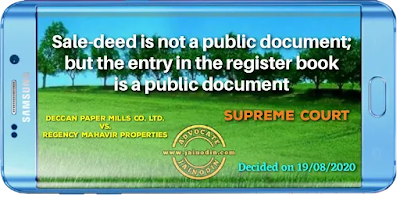The complaint was initially made in respect of acquiring huge immovable properties by respondent No. 2 in his name and in the name of his wife, and the Central Government had asked the State Government to conduct an inquiry into the said allegations. The complaint may be forged or fabricated, but it is nobody’s case that the copies of sale deeds annexed alongwith the said complaint were not genuine. While issuing direction to hold inquiry/investigation as to who had fabricated the said complaint and forged the signatures of Shri M.A. Khan, M.P., the allegations of acquiring properties by the respondent No.2 have been abandoned and unattended altogether.
Even though the complaint was bogus, however, the sale deeds annexed alongwith the same though illegally collected by someone, have not been found to be fabricated documents.[Para No.26]
It is a settled legal proposition that even if a document is procured by improper or illegal means, there is no bar to its admissibility if it is relevantand its genuineness is proved. If the evidence is admissible, it does not matter how it has been obtained. However, as a matter of caution, the court in exercise of its discretion may disallow certain evidence in a criminal case if the strict rules of admissibility would operate unfairly against the accused. More so, the court must conclude that it is genuine and free from tampering or mutilation. This court repelled the contention that obtaining evidence illegally by using tape recordings or photographs offend Articles 20(3) and 21 of the Constitution of India as acquiring the evidence by such methods was not the procedure established by law. (Vide: Yusufalli Esmail Nagree v. The State of Maharashtra, AIR 1968 SC 147; Magraj Patodia v. R.K. Birla & Ors., 1970 (2) SCC 888; R.M. Malkani v. State of Maharashtra, AIR 1973 SC 157; Pooran Mal v. Director of Inspection, Income-Tax, New Delhi & Ors., AIR 1974 SC 348; and State (NCT of Delhi) v. Navjot Sandhu alias Afsan Guru, (2005) 11 SCC 600).[Para No.27]
















